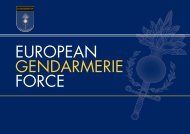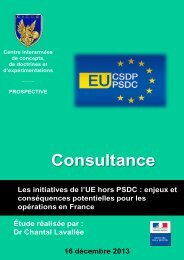Conference
science-research-bulletin-2013-conference
science-research-bulletin-2013-conference
You also want an ePaper? Increase the reach of your titles
YUMPU automatically turns print PDFs into web optimized ePapers that Google loves.
EUROPEAN POLICE SCIENCE AND RESEARCH BULLETIN<br />
SPECIAL CONFERENCE EDITION<br />
AN ANTAGONISTIC<br />
RELATIONSHIP<br />
Human rights protect the individual against abuse<br />
of power by the State and its representatives. An<br />
organisation that speaks out against violations of<br />
human rights — thus by nature acts committed<br />
(or omitted) by State agents — finds itself<br />
therefore easily in an antagonistic relationship<br />
with the State. This is in particular the case<br />
with regards to those who have specific powers<br />
that can easily be abused, such as the powers<br />
invested in law enforcement agencies to arrest,<br />
to detain, to use force and firearms, and to carry<br />
out searches and seizure.<br />
Furthermore, the endeavour to work for the<br />
respect of human rights of all persons, including<br />
those who have committed breaches of the<br />
law (or are suspected thereof) easily leads to<br />
a perception among police that Amnesty<br />
International would seek to ‘defend criminals’ or<br />
people who otherwise disturb public order in the<br />
course of demonstrations.<br />
Starting from that point of view the relationship is<br />
‘naturally’ antagonistic. Amnesty International’s<br />
view of the police will first of all look at where the<br />
police violate or otherwise do not respect human<br />
rights — and will criticise them. The focus is thus<br />
on the ‘dark side’ of policing. With this specific<br />
focus, police perceives AI to be biased, and<br />
not understanding the role and the challenges<br />
of police. This was aggravated by the fact that<br />
police in many countries of the world considered<br />
(and in some countries still considers) human<br />
rights as an impediment to ‘good’ and efficient<br />
policing. This antagonistic relationship easily<br />
leads to a ‘dialogue of the deaf’ where neither<br />
side is listening to the other side.<br />
ONLY HUMAN RIGHTS<br />
COMPLIANT POLICING IS GOOD<br />
POLICING<br />
Fortunately, over the years the relationship has<br />
evolved. Universally, respect for and protection of<br />
human rights became more and more recognised<br />
as the overarching element and principle of<br />
policing. The 1979 UN Code of Conduct for Law<br />
Enforcement Officials and the 1990 UN Basic<br />
Principles on the Use of Force and Firearms by<br />
Law Enforcement Officials are significant steps<br />
in that regard. These international standards<br />
highlight the active role police should play in<br />
upholding and protecting human rights, and<br />
today it is recognised that only human rights<br />
compliant policing can be considered ‘good’ and<br />
efficient policing.<br />
Recognising this important role of the police<br />
as protectors of human rights, Amnesty<br />
International realised more and more the need<br />
to engage in a constructive dialogue with law<br />
enforcement officials on how best to ensure<br />
human rights compliance in police work.<br />
THE POLICE AND HUMAN<br />
RIGHTS PROGRAMME OF THE<br />
DUTCH SECTION OF AMNESTY<br />
INTERNATIONAL<br />
An illustration of this evolution on both sides<br />
is the creation of the Police and Human Rights<br />
Programme at the Dutch section of Amnesty<br />
International ( 1 ). It started with an initiative<br />
of a group of Dutch police officers, who were<br />
members of Amnesty International and who<br />
wanted to organise themselves with a view to<br />
contributing to change and better human rights<br />
compliance of the police in the Netherlands.<br />
They did so through the creation of an informal<br />
police network. Their discussions and reflections<br />
very much nurtured the thinking process of the<br />
Dutch Section of Amnesty International about<br />
the police and triggered the decision to get<br />
more competence and expertise on policing<br />
in order to change the focus from the classical<br />
‘blame game’ to constructive dialogue. This<br />
led to the creation of the Police and Human<br />
Rights Programme, whose main task is to advise<br />
Amnesty International staff members and other<br />
human rights activists on police work, improve<br />
the understanding of the role and operational<br />
challenges of the police, including the high risk<br />
of police to become victims themselves and the<br />
need to give due consideration to the rights of<br />
police officers. The book ‘Understanding Policing’<br />
(Osse, 2006) today is a particularly important<br />
( 1 ) See the website of the Programme: http://www.amnesty.nl/policeandhumanrights.<br />
59





